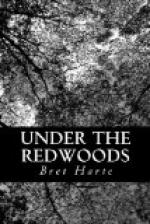The late Mr. Wade had been found dead with a bullet through his head in a secluded part of the road over Heavy Tree Hill in Sonora County. Near him lay two other bodies, one afterwards identified as John Stubbs, a resident of the Hill, and probably a traveling companion of Wade’s, and the other a noted desperado and highwayman, still masked, as at the moment of the attack. Wade and his companion had probably sold their lives dearly, and against odds, for another mask was found on the ground, indicating that the attack was not single-handed, and as Wade’s body had not yet been rifled, it was evident that the remaining highwayman had fled in haste. The hue and cry had been given by apparently the only one of the travelers who escaped, but as he was hastening to take the overland coach to the East at the time, his testimony could not be submitted to the coroner’s deliberation. The facts, however, were sufficiently plain for a verdict of willful murder against the highwayman, although it was believed that the absent witness had basely deserted his companion and left him to his fate, or, as was suggested by others, that he might even have been an accomplice. It was this circumstance which protracted comment on the incident, and the sufferings of the widow, far beyond that rapid obliteration which usually overtook such affairs in the feverish haste of the early days. It caused her to remove to Santa Ana, where her old father had feebly ranched a “quarter section” in the valley. He survived her husband only a few months, leaving her the property, and once more in mourning. Perhaps this continuity of woe endeared her to a neighborhood where distinctive ravages of diphtheria or scarlet fever gave a kind of social preeminence to any household, and she was so sympathetically assisted by her neighbors in the management of the ranch that, from an unkempt and wasteful wilderness, it became paying property. The slim, willowy figure, soft red-lidded eyes, and deep crape of “Sister Wade” at church or prayer-meeting was grateful to the soul of these gloomy worshipers, and in time she herself found that the arm of these dyspeptics of mind and body was nevertheless strong and sustaining. Small wonder that she should hesitate to-night about plunging into inconsistent, even though trifling, frivolities.
But apart from this superficial reason, there was another instinctive one deep down in the recesses of Mrs. Wade’s timid heart which she had kept to herself, and indeed would have tearfully resented had it been offered by another. The late Mr. Wade had been, in fact, a singular example of this kind of frivolous existence carried to a man-like excess. Besides being a patron of amusements, Mr. Wade gambled, raced, and drank. He was often home late, and sometimes not at all. Not that this conduct was exceptional in the “roaring days” of Heavy Tree Hill, but it had given Mrs. Wade perhaps an undue preference for a less certain, even if a more serious life. His tragic death




